Anthony McIntyre's Blog, page 1193
August 17, 2017
Ukraine: Miners Strike Back Against Wage Arrears
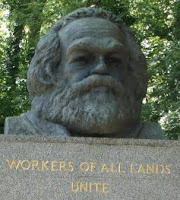 Gabriel Levy writes in People And Nature on protest action by Ukraine Miners.
Gabriel Levy writes in People And Nature on protest action by Ukraine Miners. Miners in eastern Ukraine have responded to the build-up of wage arrears and steep inflation with strikes and underground protests.
At the Kapustin mine in Lugansk region, 54 miners staged an underground sit in, and forced from their employer, Lisichanskugol’, a promise to cough up wage arrears dating back two years in some cases.
The cash was promised for Wednesday (2 August). But when it came, it was 10% short of the total, and yesterday (3 August) miners again refused to start work.
Vladimir Ivanshin, head of the local Trade Union of Coal Industry Workers (the “official”, government-linked union) said that the 10% shortfall was a “breach of the first point of the agreement” made after the sit-in.
The dispute at Kapustin first erupted on 16 July. A group of face-workers and ancillary underground men refused to leave the pit. The action began “spontaneously” and without any trade union involvement, local media reported. Miners at the Novodruzheskaya pit, owned by the same company, came out in solidarity.
The sit-in at Kapustin lasted six days. All work stopped, except for water pumping and ventilation needed to keep the mine open. A representative of the occupation came up the pit to join talks with the employers and the energy ministry in Kyiv.
The company began by saying that face workers’ pay would be cut by one third for the strike days, and the ancillary workers would lose all their pay. Mikhail Volynets, president of the Confederation of Free Trade Unions of Ukraine, called on the strikers:
not to accept these conditions and to demand average pay for the time on strike. Also let us demand an agreement that the management agrees that no [striker] will be victimised ... Let’s demand an increase in wages. It’s high time for one, given the fall in the value of the hryvna and constantly rising prices of municipal services and consumer goods.
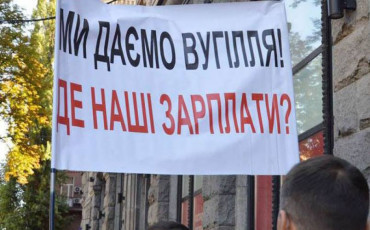 “We supply coal! Where is our pay?”
“We supply coal! Where is our pay?”Pavel Lisyansky, a lawyer and community activist, told local journalists:
The miners’ wives are saying that their husbands take cutlets with marrow filling for their lunch. They are doing hard physical work, but families just don’t have the money for more substantial meals. They are going to work half-starving.” (More from Pavel here.)
The talks in Kyiv ended on 20 July with a commitment from the employers to pay up what was owed, and the occupation ended.
On 2 August miners at the Artem-1 pit at Krivoi Rog – which is owned by Arcelor Mittal, the multinational steel and mining conglomerate – also threatened strike action, demanding a pay increase to the hryvna equivalent of 1000 euros a month. They declared an industrial dispute under law, but management would not talk to workers’ representatives.
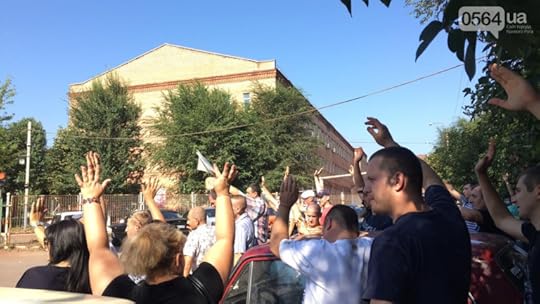 Krivoi Rog mineworkers at a meeting this week. Photo from local media
Krivoi Rog mineworkers at a meeting this week. Photo from local mediaIn a letter to Ukrainian president Petro Poroshenko, the workforce denounced the company’s refusal to negotiate on a series of workplace issues and its breaches of labour laws. Local news media reported that there were 40 workers at the meeting that adopted the letter – watched by an equal number of police.
In May, miners and metal workers at Arcelor Mittal’s complex in Krivoi Rog demonstrated, demanding parity with their European colleagues. Management announced a new set of pay grades that they claimed would provide rises of between 20% and 80% – but fell far short of that in reality.
The background to these recent protests is a catastrophic situation in the Ukrainian coal industry, caused by the combination of economic crisis and military conflict.
Many of the most modern pits, and most of those producing anthracite coal required for most Ukrainian power stations, are in areas under separatist control. There are reports that many of them have stopped working.
The Ukrainian government, in accordance with budget tightening demanded by the International Monetary Fund, has produced a plan to close ten of the 49 working pits that remain on territory that it controls. Union officials estimate that 25,000 mining jobs, and even more in the supply chains, are in danger.
The picture may change slightly if power stations are adapted to take non-anthracite grades of coal. But the re-fit required is expensive, and power companies may opt e.g. for gas.
Meanwhile, production continues to slide. At Lisichanskugol’, the largest producer in Lugansk, production at the mines on the Ukrainian side of the front line was down 27% in the first five months of this year, compared to last year; at Pervomaiskugol’, another big employer, it was down 38%. National total production was 3% down.
Note. I compiled this from reports in local media, from activists and from the mining unions. In Russian, the fullest reports I found from Lisichansk are here, here, here, here and here, and from Krivoi Rog here and here. GL, 4 August 2017.
■ See also: ‘We need new ways of organising’: interview with Pavel Lisyansky
More about Ukraine on People & Nature
■ Trade unionists oppose rail blockade (March 2017)
■ Labour and community organising near the front line (January 2016)
■ War as a means of social control (October 2014)
■ Eastern Ukraine: beyond the fragments (May 2014)
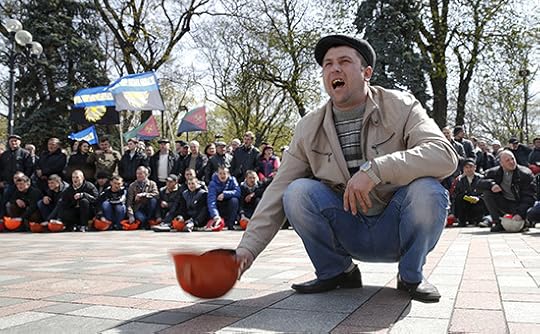 A persistent problem: these miners protested in Kyiv in 2015
A persistent problem: these miners protested in Kyiv in 2015

Published on August 17, 2017 01:00
August 16, 2017
The Danger Of A Single Media Voice
 Stanley Cohen writing in Al Jazeera. speaks out about attempts to undermine and muzzle the news outlet. Stanley L Cohen is an attorney and human rights activist who has done extensive work in the Middle East and Africa.
Stanley Cohen writing in Al Jazeera. speaks out about attempts to undermine and muzzle the news outlet. Stanley L Cohen is an attorney and human rights activist who has done extensive work in the Middle East and Africa.By attacking Al Jazeera and media diversity, the rulers of Saudi Arabia, UAE, Bahrain and Egypt seek to retain power.
The march from fake news to no news is as straight and unbroken as the runway from Washington, DC to Riyadh.
Tyranny knows no truth ... just unbridled power and a drive to extinguish it whether by mob appeal or the slam of a prison gate. Today, we are witness to a unity of drive and purpose, in both West and East, where full-scale attacks on debate and dissent have become very much the norm ... with news outlets shuttered, journalists jailed and thinkers shamed.
 Staff work inside the headquarters of Al Jazeera Network, in Doha, Qatar [Naseem
Staff work inside the headquarters of Al Jazeera Network, in Doha, Qatar [Naseem Whether it is the most recent royal family in Washington, the perpetual caste in the Kingdom of Saudi Arabia or the wannabe one in Cairo, diversity of thought, identity and purpose is under siege in ways not seen since Galileo dared to suggest that a central tenet of Christian cosmology - that the Earth lies at the centre of the universe - was factually untrue. Charged with heresy, Galileo was forced to recount and abjure.
Today, in many places, the channel of peeling truth from cosmetic reality has moved well beyond the mere papal process of 16th-century Europe to the full-on embrace of singularity of thought, be it coerced by force, banishment or closure.
Nowhere is this more painfully evident than it is, today, in the Gulf Cooperation Council (GCC) where a coalition of states, along with an assist from the North African state of Egypt, have challenged Qatar's independence by a subterfuge checklist that, in reality, boils down to their fear of Al Jazeera and what it represents in a region ruled by censorship.
Saudi Arabia
Saudi Arabia has no autonomous media, nor does it endure political parties, unions or human rights groups. The government treats online journalists, writing for state-approved news outlets, the same as it does print and broadcast journalists ... subjecting them to exacting regulation and content-based intimidation.
The internet, alone, is the sole means, within Saudi Arabia, by which a relatively robust exchange of information, from within and without the state, can circulate. However, its closely monitored "citizen-journalists" are subject to strict filtering mechanisms that scrutinise and, often, block their internet content.
Make no mistake about it, the demand that Al Jazeera close its door, as so much the price of regional 'peace', is nothing short of a desperate autocratic drive to strip the human spirit of its thirst for knowledge and its innate right to grow.
Indeed, authorities regularly monitor websites, blogs and chat rooms, as well as the content of e-mail and mobile-phone text messages.
Sites that contain "harmful", illegal, anti-Islamic, or offensive material are blocked ... as are those that carry criticism of Saudi Arabia, the royal family, or the other Gulf states.
So, too, sites that call for political reform or are critical of the current political and social landscape are blocked, as are human rights websites making the country one of the world's most repressive with respect to freedom of expression whether online or in print.
For those whose print and internet communications, or blogs, cross the rigid and narrow divide of government criticism, they run the risk of swift state reprisal ... often arrest and detainment, without specific charges, for critical or controversial remarks. Others have been accused of blasphemy, inciting chaos and defaming the king and state which can bring punishments that can run into years of imprisonment and, at times, include flogging.
Several cases speak volumes about a Saudi state that seeks to silence dialogue with ruthless punishment meted out against those who dare to dissent.
For example, Raif Badawi was arrested in 2012 on a charge of "insulting Islam through electronic channels". Subsequently he was prosecuted for apostasy and criticising the regime on his blog … which included material critical of "senior religious figures" and which suggested that Riyadh's Imam Muhammad ibn Saud Islamic University had become "a den for terrorists".
For pure speech, and nothing else, Badawi was convicted on several charges in 2013, and sentenced to seven years in prison and 600 lashes. In 2014 his sentence was increased to 10 years in prison, 1,000 lashes, and a fine. The first 50 lashes were administered on January 9, 2015 with the remainder postponed more than a dozen times since.
After his arrest, Amnesty International designated Badawi a prisoner of conscience, "detained solely for peacefully exercising his right to freedom of expression". Human Rights Watch has noted: "The charges against him, based solely to Badawi's involvement in setting up a website for peaceful discussion about religion and religious figures, violate his right to freedom of expression".
Meanwhile, Badawi's attorney, Waleed Abu al-Khair, himself a prominent human rights activist, continues to serve a 15-year sentence on charges imposed on him in 2014 stemming solely from his criticism of human rights abuses in Saudi Arabia. Among other things, Waleed was found guilty by a security court of: disobeying the ruler and seeking to remove his legitimacy, insulting the judiciary and questioning the integrity of judges, setting up an unlicensed organisation, harming the reputation of the state by communicating with international organisations and preparing, storing, and sending information that harms public order.
In March 2016, Saudi Arabia sentenced journalist Alaa Brinji to five years in prison plus an eight-year travel ban for tweets in which he criticised religious authorities and voiced support for the right of women to drive and for jailed human rights activists.
The Kingdom of Saudi Arabia is ranked 168th out of 180 countries in Reporters without Borders (RSF) 2017 World Press Freedom Index.
Bahrain
Bahrain, an island kingdom located off of the eastern coastline of Saudi Arabia in the Persian Gulf, is no more respectful of speech and press freedoms. It was listed 164th in the most recent RSF world rankings. It sees independent and vigorous journalism as an ever-present danger to its ability to control the state's domestic narrative and to maintain political power.
Infamous for jailing large numbers of journalists - in particular photographers and cameramen - Bahrain has a history of targeting political dissidents as well. Their crimes are typically little more than the will to challenge blanket restrictions upon assembly and prohibited speech.
Journalists and dissidents convicted of charges that include unlawful demonstrations and supporting "terrorism" typically receive long sentences. Often mistreated in detention, many have been imprisoned for life. Others have been sentenced to death.
Not long ago, a raid by Bahrain security forces left five people dead and hundreds detained. Recently, a court sentenced two young anti-regime protesters to death; two others were imprisoned for life and eight received sentences of three to 10 years. Nine of the pro-democracy activists saw their nationality revoked.
Just this past month, al-Wasat, the island's sole independent newspaper, was closed in yet another government effort to control the free flow of information among its population of a little more than one million.
Describing it as a temporary suspension "until further notice", the government accused this highly respected newspaper of "dissemination of information that affects national unity and the kingdom's relationship with other countries".
Egypt
When it comes to state repression of media freedom, Egypt stands alone. As we say in the law, it's sui generis... one of a kind.
Since the revolution of 2011, and the subsequent military coup of 2013, more than a dozen journalists have been killed. None have been the subject of proper and thorough investigation. No one has been held accountable. Countless others have been injured, many tortured, by security officials after having been swept up for little more than covering demonstrations.
Although precise figures are difficult to obtain, it has been estimated by various human rights groups, including the Committee to Protect Journalists (CPJ), that, today, hundreds of journalists, bloggers and social media activists are entombed in maximum-security prisons throughout Egypt. Many will spend years in detention - uncharged and untried. Others face long jail terms, including life sentences, in political witch hunts targeting those seen as enemies of the state ... often subjected to mass trials, by the hundreds, denied even a modicum of due process. In 2015 alone, some 600 people were sentenced to death in show trials.
Under a terrorism law adopted in August 2015, journalists are obliged to report only the official version of "terrorist" attacks. Failure to do so renders the offender subject to punishments ranging from a loss of government licence to fines and imprisonment.
In the summer of 2015, three privately owned newspapers were prevented from printing articles that were critical of the Egyptian president.
Earlier this year, the government banned circulation of an edition of an Egyptian weekly newspaper with an image, on its cover, of famed ex-football player Mohamed Aboutrika and his mother.
Designated a "terrorist" for his support of the presidential bid of the Muslim Brotherhood's Mohamed Morsi in 2012, today, Aboutrika lives in Qatar where he works as a sports analyst.
Recently, Egyptian authorities suspended two issues of a privately owned newspaper after it published a front-page editorial blaming the interior ministry for the Palm Sunday church bombings.
In December 2016, Egypt's president ratified a new law regulating media outlets which extended his control over them. The law creates three regulatory bodies: two to oversee state-owned press and media organisations and a Higher Council for Media Regulation to "regulate" all of Egypt's media outlets - whether public or private. It has the authority to fine, or suspend, publications and broadcasters, and to issue or revoke foreign media permits.
To understand the full nature and extent of Egypt's current effort to control what is reported, and how, one need only consider who has been targeted, and for what, since the military coup that brought Abdel Fattah el-Sisi to power.
In 2016, the head of Egypt's Journalists' Union and two board members stood trial in Cairo, charged largely with spreading "false news". In what was described as an "effort to muzzle the media", after a seven-month trial the three were convicted of harbouring two journalists who wrote for a website critical of the government and sentenced to two years in prison and fined $650.
Other prominent journalists have been swept up in what has been described as little more than a government effort to create a "state of fear". According to CPJ, photojournalist Mahmoud Abou-Zeid, known as "Shawkan", has been imprisoned since 2013, along with 700 others, for covering the dispersal of a pro-Muslim Brotherhood sit-in. Recipient of a CPJ International Press Freedom Award in 2016, "Shawkan" remains imprisoned and untried despite deteriorating health.
Others on the CPJ list of detained Egyptian journalists include Mahmoud Abdel Naby, a correspondent for Rassd News Network (RNN), who has been imprisoned since 2013. Also arrested, in 2013, were RNN executive director Abdullah al-Fakharany, co-founder Samhy Mostafa and Amgad TV presenter Mohamed al-Adly.
According to CPJ, the trio was charged with "spreading chaos" during the government dispersal of the sit-in at Rabaa Al-Adaweya.
CPJ has also followed the cases of other Egyptian journalists facing human rights abuses such as Abdallah Shousha from Amgad TV, Omar Abdel Maqsoud from Misr al-Arabia, Sabry Anwar from El Badil, Mohamed el-Battawy from Akhbar al-Youm, Abdelrahman Abdelsalam Yaqot from the Karmoz website and Hisham Gaafar, director of the Mada Foundation for Media Development.
Others held include freelance journalists Hassan el-Kabbani and Ismail Iskanderani, detained for several years without trial, and well-known human rights activist and blogger Alaa Abdel Fattah, who is serving a five-year prison term based on protest charges alone.
Egypt is ranked 161 out of 180 countries in RSF's 2017 World Press Freedom Index.
The attack on Al Jazeera
According to the Egyptian human rights group, the Association for Freedom of Thought and Expression, between May 24 and June 30, 2017, state authorities blocked access to at least 118 websites including dozens of alternative news sources. The number was considerably higher than the 21 sites security officials announced had been censored for "spreading lies" and "supporting terrorism".
The information blackout came in the wake of similar moves by GCC members Saudi Arabia, Bahrain, and the United Arab Emirates, which blocked access to websites funded by Qatar, including Al Jazeera.
Although the these countries claimed the block was necessitated by the hacking of Qatar News Agency (QNA) and the ensuing fake news report, it proved to be the first information broadside in a coordinated effort to control the independent narrative that Qatar-funded news organisations, most importantly Al Jazeera, have been making available to several hundred million viewers in one of the most volatile regions of the world.
In the days to come, what began with a move to control website access quickly escalated to a complete break in diplomatic relations in which the Saudi Arabia, the UAE, Bahrain and Egypt demanded of Qatar that it close the international network Al Jazeera, and defund various other news sources including Al Arabi Al Jadeed, Middle East Eye, Arabi21 and Egypt's Rassd News Agency.
Although other demands were made of Qatar, it is clear that a prime focus in this staged diplomatic crisis, is a desire to once again limit access to independent news sources for the region's restive populations.
Indeed, starting in the 1990s, Saudi Arabia started increasingly acquiring newspapers and TV channels, employing many of the region's most respected journalists of the day. Although the government permitted some diversity of thought and expanded coverage of Arab and international issues, no critical discussion of Saudi Arabia and its royal family, direct or otherwise, was permitted.
To some degree, this standard was relaxed by virtue of a joint venture between the Saudi-controlled Orbit Communications Company and the BBC, as they introduced an Arabic-language television station to the region. It proved, however, to be short-lived, closing less than two years later because of growing censorship demands by the Saudi government, which included refusal to permit the station to air prominent dissident viewpoints.
That was to soon change. In 1996 Al Jazeera opened, staffed largely by those same dissenting voices that lost their jobs with the closure of the Saudi-based Arabic-language BBC world service news channel.
In just five years, it became the most widely viewed Arab television station for news. Within ten years, three-quarters of Arabs looked to it as their primary source of information.
From its start there was a backlash against Al Jazeera which manifested itself in a variety of ways and intensified over time. Thus, in May 2002, Bahrain banned Al Jazeera's broadcasts from within its borders, owing to the channel's comments about Bahrain's municipal elections, labelling it as "serving Zionism". Saudi Arabia also criticised Al Jazeera's editorial line from the beginning and tried to pressure Qatar to censor the network.
Of all the states in the region, none has been more fearful or punitive towards Al Jazeera than Egypt, which has long targeted it in a transparent drive to maintain government control of information for this nation of 90 million, which have seen both a revolution and military coup in this decade alone.
Indeed, Egypt's recent decision to use Al Jazeera as a handy pretext to divert attention from internal political repression and failure is by no means of recent vintage. Since the military coup of 2013, the regime of Sisi has proven resilient and, arguably, desperate, in looking elsewhere to craft convenient foils in its own political and economic missteps.
To look towards Egypt as a veritable primer in state repression of free speech and information is a perverse understatement. Thus, not long after the coup, charges were filed against Al Jazeera TV host Ahmed Mansour, an Egyptian national, who was tried, in absentia, on allegations dating back to Tahrir Square in the final days of the 2011 revolution.
When Egypt sought Mansour's extradition from Germany to face a 15-year sentence, it refused the request, taking note that "Egypt's judicial system is politically motivated".
On other occasions the Sisi government has purposely targeted Al Jazeera journalists. In 2013, ten of its employees were accused of spreading "false news" while covering public demonstrations against the military coup that removed President Mohamed Morsi. Ultimately, only three, Baher Mohamed, Mohamed Fahmy and Peter Greste, were detained, spending more than a year in jail.
In 2016, a Cairo court sentenced a former director of news of Al Jazeera Arabic, Ibrahim Helal, to death, charging him, in absentia, with endangering national security.
This past December, Al Jazeera journalist Mahmoud Hussein, an Egyptian national, was detained upon arrival at Cairo airport. Not long thereafter, Egypt's interior ministry accused Hussein of "disseminating false news and receiving monetary funds from foreign authorities in order to defame the state's reputation". Six months later he remains in custody.
Control of information
From time immemorial, those in power - whether by force of arms, royal edicts or the shade of a ballot box too small to effect meaningful change - have sought to control the dialogue as a desperate effort to hang on to power that is not theirs to own. It will not happen.
The marketplace of ideas transcends time and place. It is a community that knows no wealth, authority or limits. It is a boundless souq that welcomes all ... no matter what race, religion or gender.
From the time of Plato to Avicenna to Beauvoir to Marx, women and men of principle and courage have struggled in pursuit of truth. Many have paid the ultimate price, in their search for it, while others have fled it ... sated with the fleeting comfort born of fame or fortune and little else.
Al Jazeera is one voice of many. It competes with a crescendo of other information partisans who seek to influence today's vision and tomorrow's journey. This competition of ideas demands the freedom that is untempered speech ... if it is to work, and work well.
At times, Al Jazeera is surely right, at others, mistaken. Ultimately, it matters not. Al Jazeera is a much-needed voice and a welcome space for the freedom of voices in agreement and opposition.
Voices bring thought. Thought brings information. Information is knowledge. Knowledge is power.
The views expressed in this article are the author's own and do not necessarily reflect Al Jazeera's editorial policy.


Published on August 16, 2017 11:00
A Living Legacy
 Derry rights and social justice campaigner Pauline Mellon raises serious questions about the North's legacy issue. Pauline Mellon blogs @ Diary Of A Derry Mother.
Derry rights and social justice campaigner Pauline Mellon raises serious questions about the North's legacy issue. Pauline Mellon blogs @ Diary Of A Derry Mother. In his comments Mr Hamilton referred to the 2014 Stormont House Agreement. This agreement contained several proposed mechanisms to deal with the past including the Historical Investigations Unit which was the proposed investigatory body and unlike the other proposals outlined was actually a requirement under European Law.
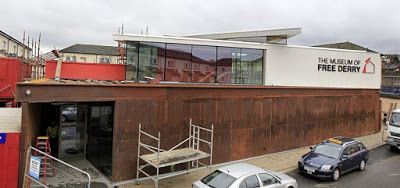
Under the Stormont House Agreement, the Historical Investigations Unit was expected to have a life span of five years to investigate troubles related deaths. Ideally this would have been a mechanism with no time limit, free from state interference and with international oversight where possible. However, the Historical Investigations Unit was set to include those who served in policing and security roles in the North during the troubles. Furthermore, the British Secretary of State was to have the power to veto information disclosure as well as the authority to remove the HIU at his/her discretion. Additionally, the Office of the First and Deputy First Ministers were to hold the power to hire and retire the chosen HIU director. Independent?
The other proposed mechanisms included the Independent Commission for Information Retrieval (ICIR), an Oral History Archive and the Implementation and Reconciliation Group (IRG) which was later removed despite being an integral element of the proposals. The IRG proved quite contentious when it was rumoured to be the mop which would clean up the remaining issues still outstanding after a five-year period through what were to be known as ‘statements of acknowledgement’ although what this meant remains a mystery. Subsequently, the public also learned of plans to limit troubles related inquests to five years and to assist British troops and Security Personnel of a certain age with evading prosecution for their respective crimes. Now if that’s not weighted in the State’s favour I don’t know what is!
There is no disputing the need to deal with the past but unless things change dramatically from the last batch of proposals then we can expect a process which is not independent, is time limited, is one-sided and will only serve the interests of the state. A state which is overly keen to revise and sanitise their role here as one of peacekeepers between sectarian factions rather than an antagonistic and adversarial one.
A contentious element of dealing with the legacy of the troubles is how the respective parties remember their dead. The British would argue that their security forces were upholding law here in line with their ‘peacekeeper’ narrative, yet their legacy in the North speaks for itself, and examination of the facts easily paints a different more accurate picture. This including their record of collusion with loyalist death squads, the use of internment (then and now), their shoot to kill policy, their indiscriminate brutalisation of communities, their brutalisation of prisoners and the Ballymurphy and Bloody Sunday Massacres, war crimes perpetrated by these ‘peacekeepers’.
A current controversy in my home city is over a display in the Museum of Free Derry (MOFD), more commonly known as the Bloody Sunday Museum. Anyone who knows me will know that I am meticulous when it comes to recording things accurately and for that reason I would generally take a stance that museums present their exhibits as such and in a neutral fashion. In this case it is how the MOFD presents a record of the names of all those killed during the Free Derry period that has caused the problems as the names of British security force personnel are listed alongside civilians and republican volunteers who lost their lives during the Free Derry period.
I spoke yesterday with local woman Marie Gallagher about this display which is now a prominent feature within the recently revamped museum. Marie is the sister of the late Jim Gallagher who was shot on a bus at the junction of the of the Fort George army barracks on the Strand road in Derry six days after his release from prison in 1976. In this case the soldier responsible later served a prison sentence in of 2 ½ years in Layhill open prison after being convicted of manslaughter. Despite having some justice after Jim’s murder Marie’s son Brian Boyle organised a recent protest at the museum in solidarity with victims who have not yet received justice.
I am aware that a museum will strive to tell the whole story of the period they represent. However, there is a fine line between historical accuracy and revisionism. The MOFD may argue that the display in question accurately reflects all those who lost their lives during the period known as Free Derry but can they state categorically that none of the state forces listed were involved in the brutalisation and murder of innocent civilians anywhere in the North? This is a valid question when you consider the many still seeking justice for crimes committed by the state here, including those murdered on Bloody Sunday some of whom were gunned down at what is now the front entrance of the MOFD.
As we consider this we must keep in mind that many issues from the Free Derry period are not just a snapshot of the past resigned to being a museum exhibit, these issues remain current and for some are as raw today as they were four and a half decades ago.
Furthermore, placing state forces in the same display as people from the community who lost their lives during that period would seem to be an attempt to give the impression of a level playing field. There has not, will not and will never be a level playing field when it comes to the British state protecting itself and the actions of its agents. As such the museum should not directly or indirectly support this fallacy under the guise of historical or factual accuracy. Particularly a museum claiming to be about ‘our future together as much as it is about the past’.
In their justification of this display the MOFD released the following in a statement:
We believe that it is important that we list all of those killed in this period, not only because it is historically accurate but also because, unlike others who would align themselves with the DUP, TUV and British government, we do not believe in any sort of hierarchy of victims.
Whether Museum Staff or the Bloody Sunday Trust choose to believe in a hierarchy of victims or not there is a hierarchy and those at the top of the pile are state agents who stand to be protected through legislation, through British Courts and when all else fails you can be sure the age-old cloak of secrecy known as the national security card will be played.
Whilst I do not subscribe to many of the outlandish conspiracy theories I have read on this issue there does seem to be a degree of normalisation at play here. This was also clear from plans discussed in 2013 to include a memorial garden in the museum. A memorial garden which would include British soldiers, something confirmed by the Museum Manager at a meeting held in the Bogside on July 25th, 2015. Despite denials following this disclosure references to this plan were found in documents obtained under Freedom of Information Legislation.
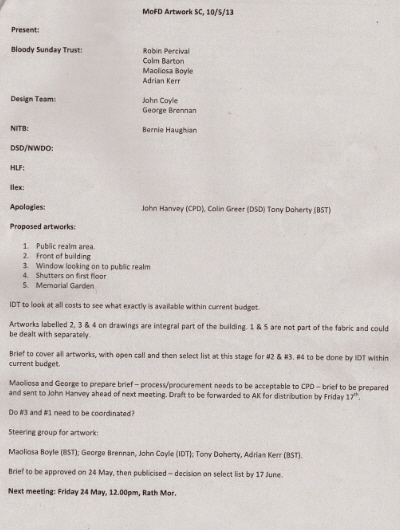
As a ‘museum of the people’ I would urge the Bloody Sunday Trust to find a solution suitable to all. As plans are underway at Whitehall to whitewash the past through a state protected, time-limited and tokenistic process, victims now more than ever need to be united on issues that will not simply require cool heads and compromise, there needs to be an understanding that there should be more that unites victims of state violence than divides them, unless of course revisionism and the rewriting of history are considered acceptable.
*Note to supporters of normalisation, you cannot normalise an abnormal situation.


Published on August 16, 2017 01:00
August 15, 2017
Abe, Izzy & Bibi
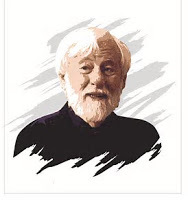 The Uri Avnery Column discusses the issues surrounding the Cave of Machpelah.
The Uri Avnery Column discusses the issues surrounding the Cave of Machpelah.All of Israel was taken in. Left, right and center. All the newspapers and TV networks, without exception.
There it was: UNESCO has declared that the Cave of Machpelah in Hebron is a Palestinian heritage site.
I Admit that I was taken in, too. The news was so clear and so simple, its acceptance so uniform, that I too accepted it unthinkingly. True, it was a bit strange, but stranger things happen.
The "Cave of Machpelah" is no cave at all. It is a large building, which the Arabs call al-Haram al-Ibrahim, the Mosque of Ibrahim, in the center of Hebron, the town the Arabs call al-Khalil, the Friend of God (meaning Abraham).
According to the Bible, Abraham, the forefather of the Jews, bought the place from its local owner as a burial plot for his wife, Sarah. When his time came, he was also buried there, as were his son Isaac with his wife Rivka and his grandson, Jacob, with his wife Leah. (His other wife, Rachel, is supposed to be buried on the way to Bethlehem.)
And here comes UNESCO, the anti-Semitic cultural branch of the anti-Semitic UN, and declares that this is a Palestinian holy site!
Is there no limit to Jew-baiting?
A tsunami of emotions surged over Israel. Jews were united in protest. Everybody vented their anger as loudly as possible. Rarely was such unanimity seen here.
If I had stopped to think for a moment, I would have realized that the whole thing was nonsense. UNESCO does not assign places to nations. World Heritage sites are – well – the heritage of the entire world. As a detail, these declarations mention in which country each World Heritage site is located.
The holy church in Nazareth is located in Israel, but it does not "belong" to Israel. The graves of holy Jewish rabbis in Russia or Egypt do not belong to Israel. UNESCO did not say that the Machpelah-al-Haram al-Ibrahim site belongs to the Palestinians. It said that it is located in Palestine.
Why Palestine? Because, according to international law, the town of Hebron is part of Palestine, which was recognized by the UN as a state under occupation. Under Israeli law, too, Hebron is not a part of Israel proper but under military occupation.
I am grateful to an ex-Israeli called Idan Landau who lives in the US. He took the trouble to read the original text and sent us emails to correct our impression. The moment I read it, I hit myself on the brow. How could I have been so stupid!
The UNESCO resolution is fair and correct. It remarks that the site is holy to the three monotheistic religions, as indeed it is. Because of this, a Jewish fanatic – a settler from America – once murdered dozens of praying Muslims there. Jewish fanatics have settled nearby.
Is The place really holy? That is a silly question. A place is as holy as people believe it to be.
Are Abraham and his progeny really buried there?
Even that is irrelevant. Many people – myself included – believe that the entire first part of the Bible, up to the Assyrian era, is fictitious. That does not make the Bible less wonderful. It is the most beautiful work of literature on earth. At least the (original) Hebrew version.
If one believes that Abraham, Isaac and Jacob were real persons, it would still be doubtful that they are buried there. An entire school of archaeologists believes that the burial place is somewhere else in Hebron, not the building now known as the Cave of Machpelah. The graves there are those of Muslim sheikhs.
Be that as it may, millions believe that the Biblical forefathers are buried in the Cave. For them, the place is holy, and it is located in occupied Palestine.
But if you take the Bible so literally, you should also read verse 9 of chapter 25 of Genesis:
And Abraham gave up the ghost and died in a good old age… And his sons, Isaac and Ishmael, buried him in the cave of Machpelah.
When I pointed this out to people who had attended Israeli schools, they were deeply shocked. Because this verse is never mentioned in any Israeli school. It does not exist.
Why? Because Ishmael is the forefather of the Arabs, as Isaac is the forefather of the Jews. We learned that Sarah, our foremother, who is described in the Bible as a real bitch, induced her obedient spouse, Abraham, to send his concubine Hagar and their son, Ishmael, into the desert, there to die of thirst. But an angel saved them, and they disappeared, though the Bible gives a long list of his progeny.
The revelation that the Bible in fact says the opposite is shocking. So Ishmael did not disappear, but somewhere along the line made his peace with Isaac. The two sons buried their father together.
This changes the story completely. It means that the Bible makes the Arabs, too, rightful heirs of the Cave of Machpelah, side by side with the Jews and the Christians.
I Do not believe that Binyamin Netanyahu ever read this verse. He knows only what every Israeli pupil knows. The strict Orthodox line.
This week, at the height of the UNESCO hysteria, Netanyahu did something bizarre: in the middle of a formal cabinet meeting he pulled a kippah from his pocket, put it on and started to read from the Bible (not the aforementioned verse, of course). He looked positively happy. He was showing the bloody Goyim up for what they are: anti-Semites all.
Does Netanyahu really believe (as I think he does) that this part of Biblical legend is history? If so, he has the mind of a 10 year old. If he does not, he is a cheat. In any case, he is a very able demagogue.
But he is not alone. Far from it. The President of Israel, a very nice gentleman, reiterated Netanyahu's accusations against UNESCO. So did the speaker of the Knesset, an immigrant from the Soviet Union.
It took about four days for some Israeli commentators to cite the true text of the UNESCO resolution. They did not apologize, of course, but at least they started to quote the actual text. Shyly and quietly some other commentators joined them. Most of their colleagues did not.
Special mention is due to Carmel Shama Hacohen, Israel's ambassador to UNESCO. He is not known as a pillar of wisdom. Indeed, he was only sent to UNESCO in order to allow a protégé of the foreign minister to take over his place in the Knesset.
During the UNESCO meeting, Shama-Hacohen - (his real name was just Shama, but that sounds too Arab, so he added the very Jewish Hacohen) - got very excited. He started a shouting match with the Palestinian ambassador, rushed to the dais and shouted at the chairman, too.
William Shakespeare might have called all this "much ado about nothing", except for two points.
One is that it shows how easy it is to send all of (Jewish) Israel – all without exception! – into a holy rage. Politicians and commentators from left and right, east and west, religious and secular, unite into one raging mass, even when the pretext is false.
Such an eruption can have very serious consequences. It disables all inner brakes.
The other aspect is even more dangerous.
At the height of the tsunami, it suddenly hit me that everybody seemed to be enjoying themselves hugely. And then I realized why.
For hundreds of years, Jews in Europe were persecuted, deported, tortured and killed. It was a part of reality. They were used to it. Anti-Semitism of all kinds, including the murderous one, was a part of reality. The sadism of the goyim was met with the masochism of the Jews.
(As I have suggested in the past, this is a part of Western Christian culture, emanating from the crucifixion story in the New Testament. It does not exist as such in Islam, since the prophet admonished his believers to protect the two other "peoples of the book" – Jews and Christians.)
Since World War II and the Holocaust, the old vicious European anti-Semitism has disappeared, or gone underground. But Jews have not got used to that. They are sure that it is lurking somewhere, that it can return any minute. When it does, or when it seems to, Jews are apt to feel "I told you so!"
In Israel, this is even more complex. Zionism hoped to rid Jews of their "exilic" complexes. To turn us into a normal people, "a people like other peoples".
It seems that this has not been quite successful. Or that the success is receding under the stewardship of Netanyahu and his ilk.
This episode has made many Jews happy. They say to themselves: "We were right! All the Goyim are anti-Semites!"


Published on August 15, 2017 13:00
The Greatest ... Not Sure
 Boyne Rover is not at all sure that Matt Treacy has called it right with his characterisation of the current Dublin team as "the Greatest."
Boyne Rover is not at all sure that Matt Treacy has called it right with his characterisation of the current Dublin team as "the Greatest."
Recently while sitting having a quiet drink, the local soccer facts and figures expert (and he really is) was having a debate with a few friends about soccer in general. Paying very little attention to them, he suddenly got up looked at me and asked who was the best club team I had ever seen. When I asked if he meant live or on TV he appeared taken aback. He stood for a second then said, "it doesn’t matter."
Before I gave my answer, I made him completely aware that I was not getting involved in his debate but would give my opinion - AC Milan. They looked at me startled: what, where, how and when seemed to flash across their faces. I knew they were itching to get into debate but I refused.
After a lot of chit chat between them the Expert said to me "why AC?" To which I replied that they had to win their own league to get there, and then a straight knockout to win with no backdoor system. They did this 3 years in a row and I had seen all 3 wins. So that was, in my opinion, no debate.
He turned around to his mates: "Jesus that was some feat, ok".
Presently, there is the on-going debate about who the better player is, Maradona or Messi. In my opinion it's Maradona. But if Messi does go to win a World Cup then it’s up for debate.
Dublin are good no doubt, but great ... not sure. Kerry were great. Of that there’s no question. But most times their opposition were Heffo’s Hero’s. At a recent championship game in Croker I was sitting beside a Dublin man and we got talking about the merits of this current crop. He gave a whole list of reasons about why they were so good. After listening for about 5 minutes I interrupted him and asked did he think they could contest the next 4 All Ireland Finals. Silence ... "why do you ask that question?"
"Well," says I:
for my tuppence worth, I thought the Dubs of the seventies were supermen. They contested six All Ireland Finals on the trot. That meant six Leinster Finals had to be won because there was no backdoor then. It was winner takes all. Even the great Kerry team couldn’t do it: their best was five.
He looked at me got up and went to the “Jacks”, returned sat down looked at me again. "Jesus, that was some going. Six Finals in a row. I’d say that will never be done again." To which I informed him that much as I admired the Dubs of that era I admired Wexford even more. They achieved that feat from 1913-1918 losing the first two, then went on to win the next four, to which he replied, "that was some going alright."
Needless to say I never saw Wexford in action but I did see Heffo’s Heros and to me this current crop have more All Ireland medals in their pockets ... but six All Irelands finals in a row ….Wow
Up Down


Published on August 15, 2017 13:00
UK Class Prejudice
Mick Hall from Organized Rage writes that:
The UK is the most class prejudiced nation in the world no amount of smoothing the rough edges will make an ounce of difference.
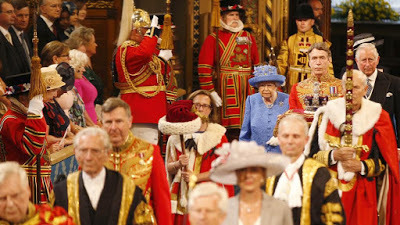
The liberal mainstream media is once again looking at class and the role it plays in society. Sadly they come at this stifling issue like a doctor whose patient is diagnosed with cancer and instead of ordering chemotherapy to stop the growth of the cancer they prescribe a course of counselling which may help the patient in the short term but almost certainly will end up with their demise.
The United Kingdom is the most class prejudiced nation in the world: no amount of smoothing the rough edges will make an ounce of difference. The very name the United Kingdom tells us all we need to know.
In his new book Richard Reeves summed up class prejudice pretty succinctly:
I write class prejudice because the advantage for a minority of the population, the upper middle classes, cannot but prejudice the prospects of working class people in every sphere, and no where is this better demonstrated than in the UK education system. I shouldn't need to spell it out but the wealth accumulated over decades, if not centuries, by their families allows 7% of the UK's children to attend public schools. (This costs up to 40K a year per child). This 7% are then fast tracked on to the best universities, and then into the professions and the city of London.
This is no quirk of fate, nor are these people any brighter than the majority of the population, it's due to the inherent class prejudice which is inbuilt into the UK state.
The Sutton Trust an educational charity has carried out surveys into this for more than a decade reported:
This is a shocking and dangerous statistic as it means at times of social upheaval, right or wrong, the military have the ruling classes back.
Again what this means is when push comes to shove the judiciary is there to defend the current status quo, and its institutions, any talk about the UK having an independent judiciary is a total fallacy, a damnable lie. From the lowest magistrate to the highest Supreme Court judge, when push comes to shove they serve the interest of the 7%.
Thus it's hardly surprising these MSM opinion formers always support the status quo and smear or belittle those who challenge it.
Class prejudice has also infected the arts, especially popular music, theatre and film, which had been opened up to working class people in the 1960s. Today a Paul McCartney will in all probability still be working in a low paid job when he reaches 64, and a budding John Lennon will never have been allowed to Imagine.
If you scratch below the surface, half of Britain's best known actors today went to fee paying schools and elite universities.
If they were starting out today actors from working class backgrounds like Michael Cain, Sean Connery, Ray Winstone and the wonderful Sean Bean would never have gained a foot in the door.
The arm-lock of this unrepresentative class is demonstrated by those who gain the most Arts Council's funding today, it boils down to elitists arts for elitist people.
 See here for more info
See here for more info
So how does such a narrow social class dominate British society and more importantly why are so many talented citizens denied the right to blossom and bloom?
As I wrote above it's due to the inbuilt class prejudice inherent within the British State. It's a pyramid system of self interest, not unlike a ponzi scheme, which is renewed regularly with fresh ruling class blood.
The monarch sits in luxury at the head, like the Red Queen in the Alice in Wonderland sequel. Her courtiers act as her worker bees co-ordinating her every move, followed by the politicians who help administer the state on her, and their behalf. Then we have the governmental system: they claim it's democratic but it's far from that. There's an unelected second chamber to anchor it down and a second elected chamber in which all members have to swear an oath of allegiance to the crown.
This wretched oath is unique, it would not be tolerated in democracies worthy of the name:
If an MP wishes to confirm, it's the same oath less the godly nonsense. Swearing loyalty to the state let alone its people doesn't get a lookin.
Next you have the hard state apparatus, the military, secret state, police and the judiciary, all of whom also swear an oath of allegiance to the crown.
The MSM play their role by talking up this frippery and deceit, and smearing and scaring anyone who challenges it and the Status Quo. Is there any other nation in the world which looks back at empire, wars, and destruction as their finest hour? When Cameron deemed during its 100 anniversary the nation should celebrate every day of WW1, these hacks roared their approval. Thankfully the overwhelming majority of the population cocked a deaf ear.
Betsy's gongs play a massive role: they're scattered amongst the boiler-house crew and they bring into the circle useful idiots who will defend almost anything as long as it's whispered in their ear.
Just how contemptuous the ruling class are towards these useful idiots is best demonstrated by the titles they maintain for the silly gongs which they dish out to them like confetti. Commander of the order of the British empire. Member of the order of the British empire. It is truly a mystery to me why anyone would accept one of these trinkets when the empire no longer exists and when it did it was a criminal conspiracy with racial bigotry within its black heart.


The UK is the most class prejudiced nation in the world no amount of smoothing the rough edges will make an ounce of difference.

The liberal mainstream media is once again looking at class and the role it plays in society. Sadly they come at this stifling issue like a doctor whose patient is diagnosed with cancer and instead of ordering chemotherapy to stop the growth of the cancer they prescribe a course of counselling which may help the patient in the short term but almost certainly will end up with their demise.
The United Kingdom is the most class prejudiced nation in the world: no amount of smoothing the rough edges will make an ounce of difference. The very name the United Kingdom tells us all we need to know.
In his new book Richard Reeves summed up class prejudice pretty succinctly:
Class is not just about money, though it is about that. The class gap can be seen from every angle: education, security, family, health, you name it. There will also be inequalities on each of these dimensions, of course. But inequality becomes class division when all these varied elements – money, education, wealth, occupation – cluster together so tightly that, in practice, almost any one of them will suffice for the purposes of class definition. Class division becomes class stratification when these advantages – and thus status – endure across generations.
I write class prejudice because the advantage for a minority of the population, the upper middle classes, cannot but prejudice the prospects of working class people in every sphere, and no where is this better demonstrated than in the UK education system. I shouldn't need to spell it out but the wealth accumulated over decades, if not centuries, by their families allows 7% of the UK's children to attend public schools. (This costs up to 40K a year per child). This 7% are then fast tracked on to the best universities, and then into the professions and the city of London.
This is no quirk of fate, nor are these people any brighter than the majority of the population, it's due to the inherent class prejudice which is inbuilt into the UK state.
The Sutton Trust an educational charity has carried out surveys into this for more than a decade reported:
Although just 7% of the population attend independent fee-paying schools, the survey reveals that almost three quarters (71%) of top military officers were educated privately, with only 12% having been taught in comprehensive State schools.
This is a shocking and dangerous statistic as it means at times of social upheaval, right or wrong, the military have the ruling classes back.
In the field of law, 70% of senior UK judges and barristers are privately or Oxbridge educated.
Again what this means is when push comes to shove the judiciary is there to defend the current status quo, and its institutions, any talk about the UK having an independent judiciary is a total fallacy, a damnable lie. From the lowest magistrate to the highest Supreme Court judge, when push comes to shove they serve the interest of the 7%.
More than half of leading MSM print journalists went to independent schools and or elitist universities, despite comprehensive state schools educating 88% of the nation's children.
Thus it's hardly surprising these MSM opinion formers always support the status quo and smear or belittle those who challenge it.
Even in medicine the Sutton Trust research shows 61% of the country’s senior doctors were educated at independent schools, etc.
Class prejudice has also infected the arts, especially popular music, theatre and film, which had been opened up to working class people in the 1960s. Today a Paul McCartney will in all probability still be working in a low paid job when he reaches 64, and a budding John Lennon will never have been allowed to Imagine.
If you scratch below the surface, half of Britain's best known actors today went to fee paying schools and elite universities.
If they were starting out today actors from working class backgrounds like Michael Cain, Sean Connery, Ray Winstone and the wonderful Sean Bean would never have gained a foot in the door.
The arm-lock of this unrepresentative class is demonstrated by those who gain the most Arts Council's funding today, it boils down to elitists arts for elitist people.
 See here for more info
See here for more info
So how does such a narrow social class dominate British society and more importantly why are so many talented citizens denied the right to blossom and bloom?
As I wrote above it's due to the inbuilt class prejudice inherent within the British State. It's a pyramid system of self interest, not unlike a ponzi scheme, which is renewed regularly with fresh ruling class blood.
The monarch sits in luxury at the head, like the Red Queen in the Alice in Wonderland sequel. Her courtiers act as her worker bees co-ordinating her every move, followed by the politicians who help administer the state on her, and their behalf. Then we have the governmental system: they claim it's democratic but it's far from that. There's an unelected second chamber to anchor it down and a second elected chamber in which all members have to swear an oath of allegiance to the crown.
This wretched oath is unique, it would not be tolerated in democracies worthy of the name:
I (name of Member) swear by Almighty God that I will be faithful and bear true allegiance to Her Majesty Queen Elizabeth, her heirs and successors, according to law. So help me God.
If an MP wishes to confirm, it's the same oath less the godly nonsense. Swearing loyalty to the state let alone its people doesn't get a lookin.
Next you have the hard state apparatus, the military, secret state, police and the judiciary, all of whom also swear an oath of allegiance to the crown.
The MSM play their role by talking up this frippery and deceit, and smearing and scaring anyone who challenges it and the Status Quo. Is there any other nation in the world which looks back at empire, wars, and destruction as their finest hour? When Cameron deemed during its 100 anniversary the nation should celebrate every day of WW1, these hacks roared their approval. Thankfully the overwhelming majority of the population cocked a deaf ear.
Betsy's gongs play a massive role: they're scattered amongst the boiler-house crew and they bring into the circle useful idiots who will defend almost anything as long as it's whispered in their ear.
Just how contemptuous the ruling class are towards these useful idiots is best demonstrated by the titles they maintain for the silly gongs which they dish out to them like confetti. Commander of the order of the British empire. Member of the order of the British empire. It is truly a mystery to me why anyone would accept one of these trinkets when the empire no longer exists and when it did it was a criminal conspiracy with racial bigotry within its black heart.


Published on August 15, 2017 01:00
August 14, 2017
Pride Has The Chance To Do The Right Thing
 A letter from Maryam Namazie to Pride on 28 July 2017.
A letter from Maryam Namazie to Pride on 28 July 2017.Michael Salter-Church
Alison Camps
Co-Chairs – Pride in London
Dear Michael Salter-Church and Alison Camps
Thank you for your letter dated 21 July addressed to CEMB’s Pride Organiser, Daniel Fitzgerald (available below).
The crux of the issue, which you have failed to recognise, is this:
Pride in London has taken complaints against the Council of Ex-Muslims of Britain (CEMB) by the likes of the East London Mosque – a centre of homophobia – seriously because of a cultural relativism and tone policing that is only applicable to critics of Islam and never critics of Christianity.

Moreover, complaints have been given credence because of the erroneous conflation of criticism of religion and the religious-Right with bigotry against Muslims.
We remind Pride that “tolerance, acceptance and recognition” are for people (whether LGBT, Muslims or ex-Muslims), not beliefs or regressive political movements and States. Whilst we must hold all human beings – even those we disagree with – in high regard, this is not the same as accepting all beliefs without criticism. Clearly, Pride is able to make distinctions between criticism of beliefs and an attack on people when it comes to non-minority groups and religions other than Islam so it should not be too difficult for you to understand our position.
In your letter you say, protest “does not give people in our parade the freedom to ostracise, discriminate against or humiliate anyone else taking part.” But the question that remains is how has our presence and placards criticising Islamic homophobia, the East London mosque, States that murder LGBT and apostates ostracising, humiliating or discriminating against anyone? Are placards critical of Christianity, the Church, Jesus, the Pope… “ostracising, humiliating and discriminating against” Christians? It seems Pride has bought into the Islamist narrative that betrays the persecuted and defends the persecutors. This is a politics that rewards bullies and blames victims.
You add:
…Pride celebrates diversity and will not tolerate any individual making derogatory remarks about a person’s sexuality, gender, gender identity, race, age, nationality, disability, appearance, religion or any other factor.
Again, you confuse criticism of religion as being the same as attacking someone because they are Muslim or gay or a woman. You merely need to change any of our placards critical of Islam to ones critical of Christianity to see how absurd your position is.
You say:
there were some placards we feel may have the potential to breach our code of conduct. These placards may be seen to reject the existence of Islamophobia, to make defamatory statements about a specific group of people, and overall could have been seen to proactively question the ability to be LGBT+ and Muslim.
This is more disingenuous nonsense and merely an attempt to justify your unjustifiable position.
Islamophobia is a misnomer that conflates criticism of religion and belief with discrimination against Muslims; we can be critical of Islamophobia as a political term used to silence dissent whilst opposing racism. We certainly don’t need a lesson in racism from Pride; our members live it every day. Also we can be critical of Islam; this doesn’t mean one cannot be Muslim and LGBT. In fact, some Bangladeshi Muslims marched with us on the day. Unlike Pride, CEMB fights on several fronts, including against Islamism, the far-Right and racism. You say some of our placards were “defamatory”? Which ones? Presumably, the defamed can take us to court; we welcome it.
As for your determining whether CEMB has broken your code of conduct and will be able to march again in future parades, we must say this: your decision will be more important for you than for us.
After all, we don’t need your permission to march for LGBT rights or the rights of apostates. But your decision will determine whether Pride, which has been a source of inspiration for LGBT globally, will continue to be a beacon by showing the courage to give LGBT ex-Muslims the right to self-expression alongside our Muslim friends and family and as a respite from our daily experience which are intrinsically linked with fear, violence and intimidation, or whether it will remain firmly corporate Pride more concerned with causing “offence” that the rights and lives of ex-Muslim and Muslim apostates and LGBT.
As a follow up to a resolution on Pride adopted at the 22-24 July International Conference on Freedom of Expression and Conscience, we ask Pride to do the following:
1) Provide evidence for the serious allegations made against CEMB
2) Make a statement against all laws criminalising homosexuality, apostasy and blasphemy and against incitement to hate and murder by preachers at mosques like the East London mosque
3) Clarify whether by condemning ‘Islamophobia’, Pride meant to side with Islamists supporting the judicial murder of ex-Muslims and gay men
4) Affirm CEMB’s continued presence at Pride in London to show that they side with dissenters and those defending the right to think, live and love as they choose.
Thankfully, as you point out, you don’t have a role in making “a legal judgement about offense or freedom of speech.” If you did, you would have already imposed de facto blasphemy laws on those of us who have fled de jure blasphemy and apostasy laws which call for our murder.
You do, however, have the chance to do the right thing. Whether you do is another matter.
Sincerely
Maryam Namazie
CEMB Spokesperson
Daniel Fitzgerald
CEMB Pride Organiser
Letter From Pride In London
21 July 2017
Dear Mr Fitzgerald,
Thank you very much for your email.
As you are aware, we have received a number of complaints regarding some of the placards your group chose to carry during the Pride in London parade.
At its heart, Pride is a movement of acceptance, diversity and unity – a safe place that celebrates difference and rejects intolerance.
Our parade has always been a home to protest, and not just to celebrate, which means we are used to seeing conflicting points of view. The tolerance, acceptance and recognition that we demand for ourselves as LGBT+ people, can only happen if we are also prepared to offer those whose opinions we don’t agree with the same courtesy.
It is also incredibly important to Pride in London that groups are able to use our platform to protest, to challenge authority and stand up for all LGBT+ rights. It is especially important that groups are able to challenge governments and states that continue to persecute, torture, imprison and even kill people simply because of their sexuality.
However, this does not give people in our parade the freedom to ostracise, discriminate against or humiliate anyone else taking part. If any individual or any group does this, they undermine the very principles on which we exist.
Our code of conduct, which every group agreed to as part of taking part in the parade, is very clear on this matter. All volunteers, staff and parade groups agree that Pride celebrates diversity and will not tolerate any individual making derogatory remarks about a person’s sexuality, gender, gender identity, race, age, nationality, disability, appearance, religion or any other factor.
LGBT+ Muslims play a vital and important role in London and in Pride. We recognise that Lesbian, Gay, Bisexual and Transgender Muslims face discrimination on both sides, from people within their faith and also from within the LGBT+ community.
Over the years the parade has been a place of acceptance for LGBT+ Muslims and this year Imaan, the LGBT+ charity, was voted the winner of the best walking group in the parade for the diversity and passion they displayed. What’s more, this year we supported the ‘Big Gay Iftaar’ as part of the Pride in London festival. We also hosted a vibrant and positive discussion about Islam and the LGBT+ community on the faith episode of our Facebook Live series. This is part of our dedication to supporting the full spectrum of the LGBT+ community.
Equally, it is also very important that individuals who once did but no longer follow the Muslim faith have a welcome place in the Pride parade. We acknowledge the difficulties individuals leaving the faith can sometimes encounter and do not in anyway seek to diminish the significance of those experiences.
To specifically address the complaints we have received, we want to be clear that we do not feel it is our role to make a legal judgement about offense or freedom of speech. However, it is our role to determine if a group has broken our code of conduct and whether they can be permitted to march again in future parades.
It has been argued that some of the placards are a legitimate form of protest. However, there were some placards we feel may have the potential to breach our code of conduct. These placards may be seen to reject the existence of islamophobia, to make defamatory statements about a specific group of people, and overall could have been seen to proactively question the ability to be LGBT+ and Muslim.
We have referred these complaints to our Community Advisory Board, who assess every parade entry after each year and decide on which groups will be allowed to march again. This decision will be taken prior to the opening of parade entries in 2018. Both the CAB and Pride in London commit to ensuring you are able to engage fully in this discussion, and welcome the opportunity to meet with you to discuss further.
We believe Pride in London must continue to play a vital role in supporting LGBT+ Muslims, as well as those who have left the faith. We want to work with community groups and charities to further these efforts, and would encourage any organisation that can play a role in building a vital bridge to get involved.
We also want to thank you for any support you can provide in the fight against hatred and bigotry. We are eager to stand side-by-side with you in this battle, supporting any actions you take to support LGBT+ people, but we also feel that the LGBT+ community can equally do more to tackle hatred and bigotry in all its forms, especially Islamophobia.
Together, I hope we can build common ground to stand up for communities that are more harmonious and supportive, valuing all citizens, no matter their faith or sexuality.
Sincerely,
Michael Salter-Church
Alison Camps
Co-Chairs – Pride in London


Published on August 14, 2017 11:00
Ireland Needs More Clergy To Become Politicians
 Social conservativism can only have a political rebirth in Ireland if the clergy take the lead and enter politics – that’s the controversial recommendation commentator Dr John Coulter makes in the latest edition of his Fearless Flying Column.
Social conservativism can only have a political rebirth in Ireland if the clergy take the lead and enter politics – that’s the controversial recommendation commentator Dr John Coulter makes in the latest edition of his Fearless Flying Column.The Churches could not stop civil partnerships, combat abortion, halt the spiralling divorce rate, and worse still, stamp out perverts in the priesthood. And if devolution is eventually restored to Stormont, the numbers of MLAs supporting the implementation of same-sex marriage in Northern Ireland looks like defeating those who hold a traditional Biblical view of the institution of marriage.
The traditional Irish street preachers’ days are also numbered, and if Churches are not careful, laws could be passed banning certain topics from being lambasted from the pulpit.
The power of the Irish Catholic bishops has been all but obliterated by the child sex abuse scandals.
The vast array of Protestant churches are so disillusioned with Unionist infighting, they have forsaken the ballot box in tens of thousands compared to the 1970s at the height of the Troubles. There is much talk that young Protestants are totally turned off by the Unionist parties’ so-called traditional social conservativism.
But when you travel around many of the evangelical denominations in Northern Ireland, you find that the vast majority of them have thriving youth sections, so could it be that young Christians are turned off political parties because those parties have become too liberal in their approach to social issues?
Ireland urgently needs to put the Bible back into the ballot box. But how will Christians achieve this if they won’t even come out to vote?
Ironically, I came across a quote from seven years ago from the hardline fundamentalist Evangelical Protestant Society which, in my opinion, had a relevant ecumenical message for all Irish Christians.
The EPS is better known for branding the Pope as the Biblical Anti Christ, and spearheading any campaign against Papal visits to Britain.
The 2010 summer edition of the EPS mouthpiece, Ulster Bulwark, carried an article entitled ‘Christians should be in politics.’ It quoted a little known fundamentalist – the Rev Tim McGlynn of the Free Church of Scotland (Continuing).
Claiming this cleric “is from a Roman Catholic background”, the article quoted Rev Tim as stating:
We need a generation of godly men and women who will bring the convictions of a Biblical and Reformed faith back into the councils, institutions and parliament of the nation once again.
That was 2010 – but Rev Tim, wherever he is today, should take comfort from my opinion that his message is as relevant in 2017 as it was when he first penned it at the start of the decade. So how could this social conservativism work in practice?
The Catholic Church should lift any ban on ordained clerics becoming councillors, MLAs, TDs, MEPs and MPs. They should not have to leave the priesthood or holy orders before standing for election.
As a weekly newspaper deputy editor in the late 1980s, I recall the many contributions which the controversial cleric, Father Pat Buckley, now Bishop Buckley, made when he was elected as an Independent to Larne Borough Council.
Week after week, he sat in the Unionist-controlled Council chamber in his clerical suit. He may still be regarded as a maverick by the Catholic hierarchy, but he broke the mould that only Protestant clerics could get themselves elected.
Love him or loathe him, Ian Paisley senior – the late Lord Bannside – slowly nudged his DUP into power-sharing with republicans. He was greatly assisted in this process by other Free Presbyterian clerics, including the Gospel-singing former South Antrim and Mid Ulster MP Willie McCrea.
Many Protestant churches have to exorcise the taboo of allowing women ministers into the pulpits as a first step to getting female Protestant clerics elected.
The Catholic Church will have to make celibacy optional for priests, nuns and members of its holy orders as a first step to allowing its clergy get elected, too.
Irish Christians and Biblical standards are being steadily marginalised across the island. For too long, Christian Churches have basked in the luxury of trivial theological debates about what type of head-gear women should wear at church; how loud men’s ties should be during a religious service; what type of music should be sung; what kind of musical instruments should be used during the praise time; where non-members of the church should sit during worship; should men be allowed to remove their jackets during a warm summer service … and the list goes on!
Some churches in Ireland insist that a person has a formal interview with church leaders before they are deemed suitable to join, giving rise to the stereotype that it is harder to get into some so-called Christian churches in Ireland that to enter Heaven itself! Perhaps the key question which should be asked is – What Would Jesus Do?
Roll on the day when a Christian coalition of married Catholic priests and ordained Protestant clerics holds the balance of power at Stormont and the Dail.
The Bible has often been blamed for sparking the Troubles with For God and Ulster on one side, versus Holy Mother Ireland on the other.
But the splits and scandals which have bedevilled the Christian churches in Ireland can only be truly healed when the Bible is restored to its once influential position in politics.
No doubt the supposedly increasingly vocal band of secularists, humanists, atheists, agnostics, and militant liberalists will be calling for me to be burnt at the stake as a heretic for daring to suggest there is still a role for Biblical Christianity in Irish politics.
I wonder, too, how many thousands of people would turn up to attend a Biblical Christian Pride March through Belfast. The LGBTQ community campaigned consistently over the decades for equality and the right to be recognised as a significant minority on this island. I wonder how long it will be before Biblical Christianity is reduced to the status of ‘minority’ in Ireland?
I’ve had my knuckles rapped in the past for daring to suggest that a time may come in Irish politics where Biblical Christians form their own Irish Christian Party because existing movements have become too liberal in their policies. Maybe the day of the so-called ICP is now about to dawn?
Follow Dr John Coulter on Twitter @JohnAHCoulter


Published on August 14, 2017 01:00
August 13, 2017
The Greatest?
Matt Treacy from Brocaire Books surveys the Dublin senior GAA team.
Had Meath not beaten Dublin in 2010, Dublin would have won 13 Leinster championships in a row last Sunday. As it happened they accomplished a record seven in succession. Thus outbidding the great Dublin team of the 1970s who won six between 1974 and 1979.
It was only the latest of records to fall to Jim Gavin’s team. The big one of course will be to attempt to win the All Ireland again in September, to make a three in a row and five out of the last seven. Their place as the greatest Dublin team of all time is generally accepted as secure. If they win this year, then they will have earned their place as at least the equal of the Kerry team of the 1970s and 80s.
Some suspected that they were becoming a tad predictable. Three draws in the league, and a narrow defeat by Kerry in the league final when bidding for a fifth consecutive title, seemed to indicate that other teams had their card marked.
That appeared to be confirmed in a dogged enough win over Carlow in the Leinster final, which ended comfortably, but was a lot more fraught than it ought to have been. The basketball tactic of bringing the ball to the rim and waiting for openings was being duplicated and to some extent neutralised.
But Jim Gavin is not one to sit back and wait for things to happen. Dublin annihilated Westmeath, to the tune of 31 points, by reverting to a much more open style which Westmeath were unable to cope with. The opening ten minutes of the final against Kildare were similar. Dublin were nine points ahead after two sublime early goals and the match was over.
Arguably they took their foot somewhat off the pedal after that but the gap remained 9 at the end. Kildare did score 1 – 17 which is more than most teams have managed against Dublin in the past seven years, but it was not sufficient. Dublin appear to have re-adopted the pre 2014 view that no matter what the other team can put on the scoreboard, we can better it. Someone once described Barcelona in their classic days as embodying the attitude that if you score three, we’ll score four or five, or six.
It is arguably a dangerous gambit as they enter the final phase of the championship. It is difficult to imagine any of the likely quarter final opponents chinning them, but after that it will be most likely Tyrone and that will be a challenge. Kerry then are the most probable final opponents if that hurdle is crossed.
The peril facing Dublin if they go toe to toe with Tyrone is that if they fall behind then there are no better men to hold onto a lead. You may be certain that the man from Ballygawley has been pondering a meeting with the Dubs for quite some time. Apart from the 2011 quarter final, which Dublin won by 7 points, there has not been much between them in subsequent league encounters including the 2013 league final, and Tyrone were the last team before Kerry in this year’s league final to actually beat Dublin.
So, it is by no means a fait accompli. If Dublin do win again this year it is likely to have been the most hard fought of all. One thing is for certain. They will not go down without a fight.


Had Meath not beaten Dublin in 2010, Dublin would have won 13 Leinster championships in a row last Sunday. As it happened they accomplished a record seven in succession. Thus outbidding the great Dublin team of the 1970s who won six between 1974 and 1979.
It was only the latest of records to fall to Jim Gavin’s team. The big one of course will be to attempt to win the All Ireland again in September, to make a three in a row and five out of the last seven. Their place as the greatest Dublin team of all time is generally accepted as secure. If they win this year, then they will have earned their place as at least the equal of the Kerry team of the 1970s and 80s.
Some suspected that they were becoming a tad predictable. Three draws in the league, and a narrow defeat by Kerry in the league final when bidding for a fifth consecutive title, seemed to indicate that other teams had their card marked.
That appeared to be confirmed in a dogged enough win over Carlow in the Leinster final, which ended comfortably, but was a lot more fraught than it ought to have been. The basketball tactic of bringing the ball to the rim and waiting for openings was being duplicated and to some extent neutralised.
But Jim Gavin is not one to sit back and wait for things to happen. Dublin annihilated Westmeath, to the tune of 31 points, by reverting to a much more open style which Westmeath were unable to cope with. The opening ten minutes of the final against Kildare were similar. Dublin were nine points ahead after two sublime early goals and the match was over.
Arguably they took their foot somewhat off the pedal after that but the gap remained 9 at the end. Kildare did score 1 – 17 which is more than most teams have managed against Dublin in the past seven years, but it was not sufficient. Dublin appear to have re-adopted the pre 2014 view that no matter what the other team can put on the scoreboard, we can better it. Someone once described Barcelona in their classic days as embodying the attitude that if you score three, we’ll score four or five, or six.
It is arguably a dangerous gambit as they enter the final phase of the championship. It is difficult to imagine any of the likely quarter final opponents chinning them, but after that it will be most likely Tyrone and that will be a challenge. Kerry then are the most probable final opponents if that hurdle is crossed.
The peril facing Dublin if they go toe to toe with Tyrone is that if they fall behind then there are no better men to hold onto a lead. You may be certain that the man from Ballygawley has been pondering a meeting with the Dubs for quite some time. Apart from the 2011 quarter final, which Dublin won by 7 points, there has not been much between them in subsequent league encounters including the 2013 league final, and Tyrone were the last team before Kerry in this year’s league final to actually beat Dublin.
So, it is by no means a fait accompli. If Dublin do win again this year it is likely to have been the most hard fought of all. One thing is for certain. They will not go down without a fight.


Published on August 13, 2017 13:00
Lets Not Be Beastly To The Tories Says Yvette Cooper
 Mick Hall from Organized Rage vigorously asserts a right to politically mock and ridicule.
Mick Hall from Organized Rage vigorously asserts a right to politically mock and ridicule. 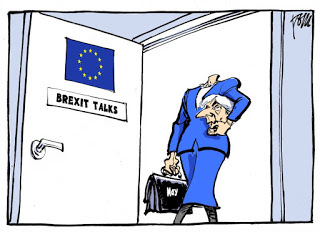
Last weekend the Labour neoliberal MP Yvette Cooper launched a defence of the BBC political editor Laura Kuenssberg, as she called on Labour to be a “broad-based party” and its supporters to stop engaging in “vitriolic abuse” online.
Empathy with her own party members is not something this woman does, although she is quite happy to emphasise with Ms Kuenssberg, a journalist who has been to the fore since 2015 when it comes to attacking Jeremy Corbyn and his supporters. More often than not when BBC TV broadcast an attack on Jeremy it was under her byline.
Nor did she have a word to say about the head of the BBC's Westminster political programmes, Robert Gibb being named as Theresa May's new director of communications. Gibb edits the Daily Politics on which Laura Kuenssberg regularly attacked Corbyn. Instead of attacking these old boys networks and revolving chairs, Cooper attacks those who are attempting to hold the MSM to account.
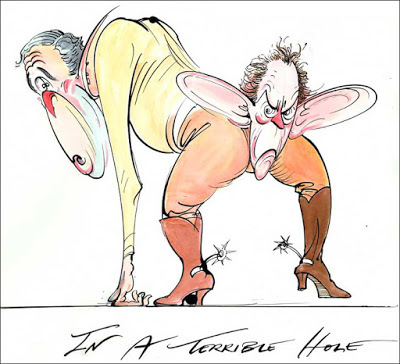
Cooper then lectured party members not to be beastly to Tories:
Nor is there any excuse for vitriolic abuse against our opponents. During this general election campaign some Tory women MPs and candidates were targeted with unacceptable personal abuse from the left.
No examples are given but what the hell? When did the likes of her ever deal with facts? Instead she attacked party members who are Corbyn supporters:
We’ve seen Labour supporters at rallies holding placards with the severed head of Theresa May. Maybe it was meant as a joke. It isn’t funny.
While she felt:
“huge anger” at what May was doing I never ever want to see Labour people mocking up pictures of her head on a stake. I never ever want our party to dehumanise our opponents. That’s what the far right do.
In my time I has seen a few mocking pictures of Tory MP's and enjoyed every one. In the last GE campaign Jackie Doyle Price, the Tory candidate in my constituency, had her posters improved by a wag adding a Hitler mustache. My friends and neighbors thought she looked all the better for that.
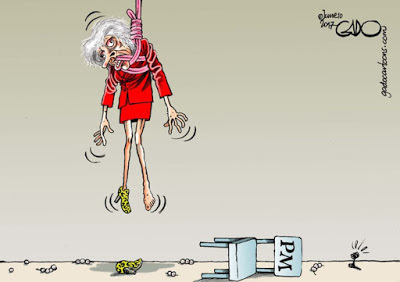
Ridicule and mockery have always been an integral political weapon going back to the 17th century, if not before. As the Arab writer Yazan Al-Saadi once wrote "Satire is supposed to be an act that punches up to power, and not down to the weak." Ms Cooper clearly prefers it to be the other way around.
Was the wonderful cartoonist Peter Riddle wrong to place Mrs May head first in a dustbin? Was Gerald Scarfe wrong to portray Blair up GW Bush's backside? I think not. Far from dehumanising these politicians the best satirists and cartoonists expose them for what they are and long may it be so.
I wonder what the giants of the LP would think about Cooper's bleating about not being beastly to the Tories? Aneurin Bevan might have had something to say as he was a man who believed the only good Tory was in the cemetery. Aneurin was a plain speaking man as this example shows:
What is Toryism but organised spivvery? … No amount of cajolery can eradicate from my heart a deep burning hatred for the Tory Party … So far as I am concerned they are lower than vermin.
Any LP member who doesn't also believe this today, is to my mind in the wrong party.
Skwawkbox best summed up Ms Coopers behavior:
Ms Cooper might, of course, not have intended her remarks as part of a tactic undoubtedly represented by the furore whipped up last week by the media and other right-wing 'Labour' MPs - but the net effect was the same ... And whatever the truth about her motivations in the speech, it should be remembered that Cooper was widely reported to be preparing - and her allies were briefing the press about - a bid to challenge Corbyn for the leadership had the 'Corbyn surge' not inconveniently made that impracticable. Some quarters even reported that Cooper had to sack a team she had put together in readiness for her bid.
Cooper and her ilk have spent all their political lives scheming and plotting in what used to be called smoke filled rooms. They believed they had a god given right to decide who was on the way up, or down, who was due a good kicking in the MSM, who was to be lorded. That is how the Blairites and Brownites practiced their politics.
She spent the first part of her political career clinging to the greasy pole desperately seeking status, and the second climbing it, and god help whoever was below her in the pecking order.
These MSM enhanced whipped-up anti-Semitic, and misogyny smears are just a rehash of the type of stuff we have witnessed since 2015. The establishment to which Cooper belongs have no new ideas, no inspiration, just the same old neo liberal elitist crap which make them and MSM talking heads like Laura Kuenssberg irrelevant, damaged goods, desperately looking for a new home.
But ever the helpful fellow I would advise Mrs Balls the world has changed, as Bevan once said:
"We know what happens to people who stay in the middle of the road to long, they get run down."


Published on August 13, 2017 07:00
Anthony McIntyre's Blog
- Anthony McIntyre's profile
- 2 followers
Anthony McIntyre isn't a Goodreads Author
(yet),
but they
do have a blog,
so here are some recent posts imported from
their feed.



